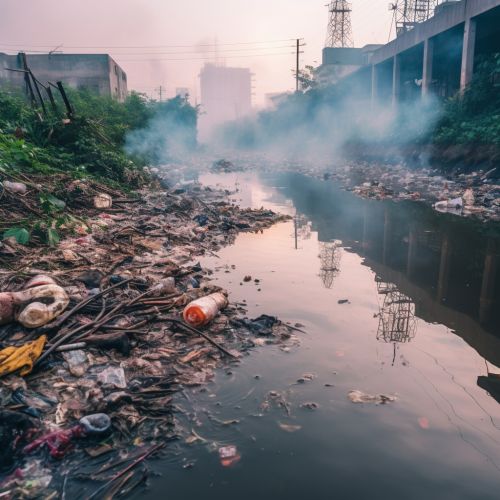Environmental impact of water pollution
Introduction
Water pollution is the contamination of water bodies, usually as a result of human activities. Water bodies include lakes, rivers, oceans, aquifers and groundwater. Water pollution results when contaminants are introduced into the natural environment. For example, releasing inadequately treated wastewater into natural water bodies can lead to degradation of aquatic ecosystems. Consequently, this can cause widespread damage to the environment and to human health.


Causes of Water Pollution
Water pollution can be caused by a plethora of different contaminants, including chemical waste, industrial effluent, litter and untreated sewage. These pollutants can have a devastating effect on aquatic life, causing death and disease to a wide range of organisms, from tiny single-celled organisms to large mammals.
Industrial Waste
Industrial waste often contains many harmful substances that can contaminate water supplies and the surrounding environment. These can include heavy metals, such as lead and mercury, which can accumulate in the food chain and have serious health effects on humans and other animals.
Agricultural Runoff
Agricultural runoff is another major cause of water pollution. This occurs when rainwater or irrigation water washes off fields and into water bodies, carrying with it pollutants such as pesticides, fertilizers and animal waste. These substances can cause eutrophication, a process that leads to excessive growth of algae and other aquatic plants, which can deplete oxygen levels in the water and lead to the death of other aquatic organisms.
Sewage and Wastewater
Untreated or inadequately treated sewage and wastewater can be a major source of water pollution. This can contain a variety of harmful bacteria and viruses, as well as chemical pollutants. When this untreated waste is discharged into water bodies, it can cause serious health problems for people who come into contact with the contaminated water or consume seafood that has been exposed to the pollutants.
Effects of Water Pollution
The environmental impact of water pollution is vast, affecting all aspects of the ecosystem.
Impact on Aquatic Life
Water pollution can have a devastating impact on aquatic life. Pollutants such as heavy metals, pesticides and industrial chemicals can accumulate in the bodies of aquatic organisms, leading to a range of health problems and even death. The decrease in oxygen levels caused by eutrophication can also lead to the death of fish and other aquatic organisms.
Impact on Human Health
Water pollution can also have serious impacts on human health. Humans can be exposed to water pollutants by drinking contaminated water, eating seafood that has been exposed to pollutants, or coming into direct contact with polluted water. This can lead to a range of health problems, including gastrointestinal illnesses, neurological disorders, and even cancer.
Impact on the Environment
The environmental impact of water pollution is not limited to the direct effects on aquatic life. Pollutants can also accumulate in the sediment of water bodies, where they can remain for many years and continue to cause harm. Furthermore, the excessive growth of algae and other plants caused by eutrophication can disrupt the balance of aquatic ecosystems, leading to long-term changes in the species composition and functioning of these systems.
Prevention and Mitigation
There are several strategies that can be used to prevent and mitigate the environmental impact of water pollution.
Regulation and Enforcement
One of the most effective ways to prevent water pollution is through the regulation and enforcement of environmental laws. This can include laws that limit the discharge of pollutants into water bodies, as well as laws that require the treatment of industrial and municipal wastewater.
Education and Awareness
Education and awareness campaigns can also play a key role in preventing water pollution. By informing the public about the causes and effects of water pollution, these campaigns can encourage individuals and businesses to take steps to reduce their own impact on water quality.
Technological Solutions
Technological solutions can also be used to prevent and mitigate water pollution. For example, advanced wastewater treatment technologies can remove a greater proportion of pollutants from wastewater before it is discharged into the environment. Similarly, technologies such as green roofs and rain gardens can reduce the amount of stormwater runoff that carries pollutants into water bodies.
